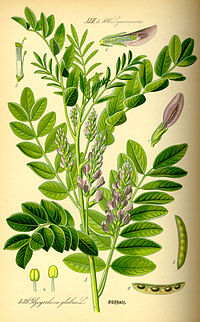
Photo from wikipedia
The growing concern regarding the potential risks of pesticides and their impact on non-target organism stimulates the development and application of alternative, environmentally-friendly products. It seems necessary to develop alternatives… Click to show full abstract
The growing concern regarding the potential risks of pesticides and their impact on non-target organism stimulates the development and application of alternative, environmentally-friendly products. It seems necessary to develop alternatives for conventional products and for those already widely used in organic agriculture, e.g. copper. Very importantly, such alternative products should not limit the productivity and profitability of agriculture. In this study, we examined the efficacy of licorice (Glycyrrhiza glabra) leaf extract as such an alternative. We tested its impact on the virulence of Pseudomonas syringae towards the model plant Arabidopsis thaliana and the crop plant tomato (Solanum lycopersicum) as well as of Clavibacter michiganensis, Xanthomonas campestris and Phytophthora infestans towards tomato, at multiple levels. We could demonstrate that licorice leaf extract acts as direct fungicide and bactericide. Moreover, it acts against a metalaxyl-resistant P. infestans strain. In addition, the extract from licorice leaves influences the plant immune system, modulating the plant responses to the challenge with pathogen(s), this involves both salicylic acid and ethylene-based responses. Our results show that in addition to the well-known use of licorice root extract in medicine, the leaf extract can be an effective alternative in organic and integrated farming, contributing to copper reduction and resistance management.
Journal Title: Plant disease
Year Published: 2022
Link to full text (if available)
Share on Social Media: Sign Up to like & get
recommendations!